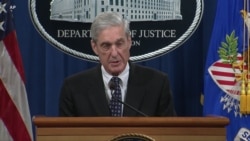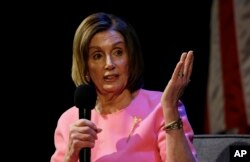While reiterating his claim that the special counsel's report fully exonerates him, U.S. President Donald Trump is attacking the head of that investigation, former director of the Federal Bureau of Investigation Robert Mueller, as a conflicted prosecutor.
Mueller "should have never been chosen" to head the special investigation because he "is a true never-Trumper," the president told reporters Thursday morning on the White House South Lawn, a day after Mueller made his first public remarks on his probe into Russian interference in the 2016 election.
"He's somebody who didn't like Trump," the president added, claiming he spurned Mueller's desire to again run the FBI.
Trump, subsequently on Air Force One during a flight to Colorado, tweeted that Mueller was among those who visited him in the Oval Office seeking to be named FBI director.
There is no indication Mueller expressed wanting to return to his old job and he has never publicly stated a political opinion of the president.
The president also said there had been a business dispute previously between himself and Mueller, and claimed that the special counsel "loved" James Comey. Comey was fired by Trump as FBI director and the president referred to him on Thursday as Mueller's "best friend."
"Some of the worst human beings on Earth," who were supporters of his 2016 general election opponent, Hillary Clinton, worked for Mueller on the two-year investigation, claimed Trump.
Mueller on Wednesday said there was "insufficient evidence" to charge Trump with a "broader conspiracy" during the 2016 election, while stressing the investigation did not exonerate the president of wrongdoing.
"If we had confidence that the president clearly did not commit a crime, we would have said that," Mueller said Wednesday at the Justice Department.
WATCH: Mueller on indicting a sitting president
Mueller's final report uncovered nearly a dozen potential instances of obstruction of justice but he reiterated Wednesday that charging Trump was not an option his office could consider under Justice Department guidelines.
Mueller's remarks prompted additional Democratic Party lawmakers, including some of the nearly two dozen running for president, to call for the House of Representatives to launch an impeachment inquiry into the president's activities and his 2016 election campaign.
House Speaker Nancy Pelosi has resisted the growing pressure for such a drastic move.
"You don't bring an impeachment unless you have all the facts," she told the Commonwealth Club in San Francisco on Wednesday. "We won't be swayed by a few people who think one way or another who are running for president — as much as I respect all of them — and they have the freedom to be for impeachment," added Pelosi.
Trump told reporters before boarding the Marine One helicopter "there was no high crime and no misdemeanor. So how do you impeach on that?"
Article II, Section 4 of the U.S. Constitution states: "The President, Vice President and civil Officers of the United States shall be removed from Office on Impeachment, for and Conviction of, Treason, Bribery, or other High Crimes and Misdemeanors."
The president, in a 17-minute exchange of questions and answers with reporters on Thursday, told reporters he finds impeachment "a dirty, filthy, disgusting word."
Trump also asserted on Thursday that under Article II of the U.S. Constitution he has "presidential powers that you wouldn't believe" shielding him from any obstruction of justice charge.
Mueller during his statement the previous day to reporters announced the closure of his office after concluding in late March the extensive investigation into Russian interference in the 2016 U.S. presidential election and whether Trump had obstructed justice.
"You know who got me elected? I got me elected," said Trump. "Russia didn't help me at all."
The Russians, "I think, helped the other side," asserted the president.
Those remarks came minutes after Trump had tweeted what many interpreted as an acknowledgment that Moscow, in fact, helped get him elected:
Mueller was appointed as special counsel in May 2017 after Trump fired Comey. Mueller was tasked with investigating any links or coordination between the Trump campaign and Russia and whether Trump later interfered with the investigation.
In his statement, Mueller sought to play down reported friction with the attorney general over the manner in which the report was released to Congress and the public.
Barr initially sent a four-page summary of the report's principal conclusions to Congress, followed by a redacted version of the full report last month. The Democratic-controlled House Judiciary Committee later voted to hold Barr in contempt of Congress for failing to release the full report along with the underlying evidence used to prepare it.
Mueller said that while he asked the attorney general to release "certain portions of the report "to Congress early on, he did "not question the attorney general's good faith" in deciding to make the entire report public at a later date.








